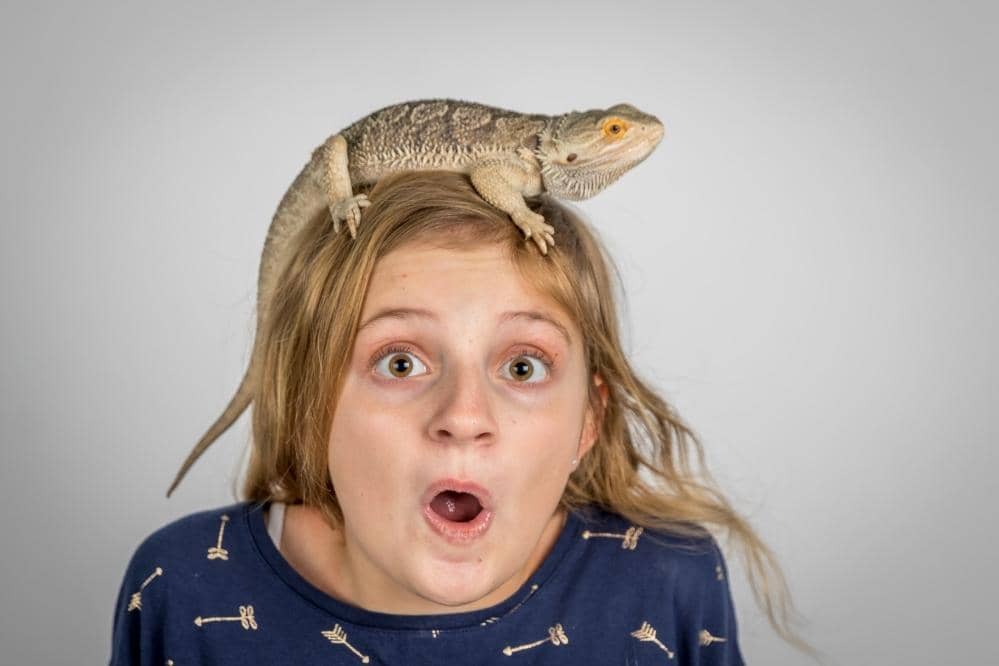Bearded Dragons are incredibly enjoyable pets in a variety of ways and continuously gaining popularity among pet lovers (after dogs and cats.) for the last decade or two. As a bearded dragon fancier and owner, you ensure to provide your beardie the best habitat, diet and accessories, and healthy lifestyle. After doing all this, naturally, you wonder, does my bearded dragon really acknowledge and appreciate my endeavors, or does my bearded dragon links me with his well-being? In other words, you are searching for an answer to the question frequently asked by bearded dragon owners “do bearded dragons know their owners.” Since I am also one of such beardie fanciers, I searched a lot on this topic; let’s see what I concluded.
Do Bearded Dragons Know Their Owners?
Yes, bearded dragons recognize their owners and even know their voices and will respond immediately when you call them or hear your voice. Many owners have reported that when they enter the room, their beardies start looking at them (when inside the tank) or running toward them (when they are roaming free in the room). So bearded dragons show recognition signs when they see you because they associate you with love, affection, and food. It’s really a great feeling when you see that your bearded friend knows who you are, isn’t it?
Some Other Signs That Your Bearded Dragon Recognizes You
Some common signs that show that your bearded dragon knows you are:
- When they enter the room, the beardies generally turn toward their owners or come close to the glass wall while looking at them.
- When the owner speaks or calls them, beardies turn their heads toward their owners without showing any aggressive signs.
- They will not run away, hide or become aggressive when the owner enters his hand in the tank to feed them, hold and take them out, or pet them.
The presence of all the signs at the same time is not necessary. If only one or two of the symptoms mentioned above are present, it is enough to prove that your bearded dragon knows who you are and is not considering you a threat. However, if your bearded friend is not responding like mentioned above, you need to develop a bond with your pet. And how you can do this, just continue reading to learn.
How To Develop Bond?
Here are 5 ways you can make your bearded dragon recognize you.
Be Patient
The primary rule to develop a good bond with your bearded dragon is to be patient. Since beardies are solitary and territorial animals, they generally don’t like the presence of anyone around them. In addition, like humans, every bearded dragon is different, and it’s possible that your beardie may take more time to become familiar with you than your friend’s or neighbor’s beardie. In addition to their territorial and solitary nature, in the wild, they have to be careful of many predators (due to their small size), so bearded dragons consider anything (including you) approaching them as a threat or predator. So for a bearded dragon fancier, the sigma rule is to be patient and continue to look after him until he understands you are not a threat to him.
Spend Time Together
The next rule is to spend maximum time with your bearded friend. The more time you spend with your beardie, faster he will become familiar with you. So make sure to perform different activities (like feeding, cleaning their tank, etc.) by yourself and don’t involve any other person. Naturally, slowly your bearded dragon will start recognizing you and associating your presence with care, comfort, diet, and love rather than a threat.
Be Gentle And Slow While Handling
It’s really crucial to be slow and gentle while handling your bearded dragon. You must move slowly when you approach your beardie or enter your hand in his enclosure to pick him out. In addition, it’s also necessary not to approach your beardie from above; instead, you should approach him from the front, from where he can see what’s going on. Moving fast or approaching from above will make your bearded dragon interpret your hand as a predator. A startled beardie can not only be aggressive and can bite you but also will lose trust in you and may consider you a threat next time.
Understand Body Language
Naturally, when we are disturbed, upset, or not feeling well due to any reason, we avoid social contact and don’t want anyone to talk to us. Similarly, even if you are going in the right direction and developing a good bond with your bearded friend, it is still possible that your beardie may act differently sometimes. This could be because your bearded pet is not feeling well or comfortable in his tank for any reason. The best strategy in such a situation is to leave him alone for some time and let him calm down.
Every bearded dragon expresses his feelings with specific signs or body gestures (like hissing, head puffing, arms waving, black beard, etc.). So it’s crucial for a bearded dragon’s owner to learn to interpret the body language of a beardie because only then will you be able to understand when you should avoid approaching or handling beardies.
Activities Outside Tank
Bearded dragons really like to spend some time outside their tank. Allowing them to play for a while in a safe and secure place outside their enclosures will not only improve their well-being but also strengthen your bond. You can also arrange some beardie toys that will add further joy to his life.
Related Article Can My Bearded Dragon Live Outside A Tank?
Final Thought
Yes, bearded dragons know their owners; however, unlike dogs or cats, beardies take more time to get familiar with humans. Due to their territorial and solitary personalities, bearded dragons have trust issues and may avoid their new owners or become aggressive when their new owner approaches them. If you are consistent and patient enough and continue to look after them, soon, the beardies will start recognizing you as a friend. At this point, both of you will start enjoying a healthy relationship.

